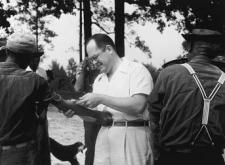Did Infamous Tuskegee Study Cause Lasting Mistrust of Doctors Among Blacks?
By Aaron E. Carroll,
The New York Times
| 06. 17. 2016
There is no question that the Tuskegee study is one of the most horrific examples of unethical research in recent history. For 40 years, ending in 1972, members of the United States Public Health Service followed African-American men infected with syphilis and didn’t treat them (although they told some men they did) so that they could see the disease take its course.
There’s also no question that this experiment shook the foundations of trust between Americans, especially black Americans, and the medical establishment. A new paper argues that this wound was so severe that it led older African-American men to avoid care, leading to a decrease in life expectancy of 1.4 years, accounting for about a third of the discrepancy in life expectancy between black and white men by 1980.
While few question that there are racial disparities in life expectancy or health care, and no one questions the utter lapse in ethics of the Tuskegee experiment, we should still be wary in connecting the two without a clear causal link. To do so compounds mistrust in the health care...
Related Articles
By Evelina Johansson Wilén, Jacobin | 01.18.2026
In her book The Argonauts, Maggie Nelson describes pregnancy as an experience marked by a peculiar duality. On the one hand, it is deeply transformative, bodily alien, sometimes almost incomprehensible to the person undergoing it. On the other hand...
By Daphne O. Martschenko and Julia E. H. Brown, Hastings Bioethics Forum | 01.14.2026
There is growing concern that falling fertility rates will lead to economic and demographic catastrophe. The social and political movement known as pronatalism looks to combat depopulation by encouraging people to have as many children as possible. But not just...
By Katherine Long, The Wall Street Journal | 12.27.2025
Nia Trent-Wilson owes $182,889.63 in medical bills for a baby that wasn’t hers.
In late 2021, she agreed to act as a surrogate through an agency that paired her with a gay couple from Washington, D.C. The terms were typical...
By Katherine Long, Ben Foldy, and Lingling Wei, The Wall Street Journal | 12.13.2025
Inside a closed Los Angeles courtroom, something wasn’t right.
Clerks working for family court Judge Amy Pellman were reviewing routine surrogacy petitions when they spotted an unusual pattern: the same name, again and again.
A Chinese billionaire was seeking parental...




